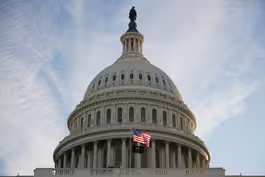
How the Trump administration plans to slash NASA's budget
Clip: 6/2/2025 | 9m 38sVideo has Closed Captions
How the Trump administration's plans to slash NASA's budget will impact science
Funding for science is very much on the chopping block in President Trump's proposed budget. It's a fraught moment for NASA, particularly for those focused on earth science and not human space travel. Over the weekend, Trump announced he was withdrawing the nomination of his original pick to lead NASA, billionaire Jared Isaacman. Miles O'Brien reports.
Problems playing video? | Closed Captioning Feedback
Problems playing video? | Closed Captioning Feedback
Major corporate funding for the PBS News Hour is provided by BDO, BNSF, Consumer Cellular, American Cruise Lines, and Raymond James. Funding for the PBS NewsHour Weekend is provided by...

How the Trump administration plans to slash NASA's budget
Clip: 6/2/2025 | 9m 38sVideo has Closed Captions
Funding for science is very much on the chopping block in President Trump's proposed budget. It's a fraught moment for NASA, particularly for those focused on earth science and not human space travel. Over the weekend, Trump announced he was withdrawing the nomination of his original pick to lead NASA, billionaire Jared Isaacman. Miles O'Brien reports.
Problems playing video? | Closed Captioning Feedback
How to Watch PBS News Hour
PBS News Hour is available to stream on pbs.org and the free PBS App, available on iPhone, Apple TV, Android TV, Android smartphones, Amazon Fire TV, Amazon Fire Tablet, Roku, Samsung Smart TV, and Vizio.
Providing Support for PBS.org
Learn Moreabout PBS online sponsorshipAMNA NAWAZ: Well, funding for science is also very much on the chopping block in the president's proposed budget.
That includes cuts to NASA.
It's a fraught moment for the agency, particularly for those focused on earth science and not human space travel.
Just this weekend, President Trump announced he was withdrawing the nomination of his original pick to lead NASA, billionaire Jared Isaacman.
Our Miles O'Brien has a look at all of this, starting with the proposed cuts.
NEIL ARMSTRONG, Former NASA Astronaut: That's one small step for man, one giant leap for mankind.
MILES O'BRIEN: It would be the largest single-year budget cut in NASA's storied history, including the early '70s, when the Apollo moon program was winding down.
The Trump White House wants to reduce the $25 billion allocation for the space agency by 24 percent.
Space science would be cut nearly in half.
ADAM RIESS, Johns Hopkins University: That would be sort of, I won't say, almost extinction level for a lot of the space science that we pursue.
MILES O'BRIEN: Adam Riess is a professor of physics and astronomy at Johns Hopkins University.
He and two colleagues won the Nobel Prize in physics for discovering the acceleration of our expanding universe.
They used the Hubble space telescope, along with ground-based instruments, to collect their data.
ADAM RIESS: I think people are awed and inspired by the mystery of space, what's out there.
These are, in the scheme of things, relatively modest investments for us as humans to do this most ambitious thing, to try to understand the place in which we live.
MILES O'BRIEN: The budget would eliminate a planned robotic mission to bring to Earth rock and regolith samples from the surface of Mars.
It cuts climate monitoring satellites, eliminates green aviation programs, and zeros out science education efforts, declaring them woke.
It's just part of the wholesale targeting of federally funded science.
The National Science Foundation, the National Institutes of Health, the Centers for Disease Control and Prevention, the Environmental Protection Agency, and the National Oceanic and Atmospheric Administration are all facing steep cuts.
JOHN GRUNSFELD, Former NASA Associate Administrator for Science: It actually looks pretty bleak across the spectrum.
MILES O'BRIEN: John Grunsfeld is an astrophysicist and astronaut who flew five shuttle missions, including three to upgrade and repair Hubble.
He later served as NASA's associate administrator for the Science Mission Directorate.
JOHN GRUNSFELD: It sends a signal that America is stepping back from leadership in virtually every science area, including NASA.
The proposal for the NASA science budget is, in fact, cataclysmic for U.S. leadership in science.
MILES O'BRIEN: No one in the Trump administration responded to our repeated requests for comment.
Former National Space Council Executive Secretary Mark Albrecht was not a party to the White House budget proposal, but he helped lead the 2024 Trump transition team at NASA.
Is the Trump administration anti-science?
MARK ALBRECHT, Former Executive Secretary, National Space Council: Absolutely not.
But I can assure you there's no evidence that I have ever seen that there is a desire to reduce America's leadership in science.
MILES O'BRIEN: NASA's science that has anything to do with climate change is targeted for cuts.
MARK ALBRECHT: What was eliminated were things that were not contributing to the central mission.
If you ask the question, who is the lead agency in the federal government for climate and climate research, the answer is NOAA.
So the issue is not that we don't do climate research, but that we move it over to NOAA, who is the agency that's responsible for it.
MILES O'BRIEN: But NOAA is facing similar deep cuts.
The Trump NASA budget does preserve funding for the Nancy Grace Roman, Hubble, and Webb Space telescopes.
MAN: And liftoff of Artemis 1.
MILES O'BRIEN: It adds money for human spaceflight, $7 billion for a return to the moon, and a billion for missions focused on Mars.
LORI GARVER, Former NASA Deputy Administrator: There's this singular focus on human spaceflight that NASA really has never historically had before.
MILES O'BRIEN: Lori Garver was the deputy administrator of NASA in the Obama years.
She says the agency may have first caught the public fancy by putting flags and footprints on the moon, but it has evolved into an unrivaled science and engineering enterprise, offering plenty of breakthroughs and thrills, no astronauts required.
LORI GARVER: Underneath the human spaceflight program has always been aeronautics research, robotics, scientific exploration, and earth sciences, viewing the Earth from space.
Those are the things that continue year after year to poll pretty high in the public realm.
MILES O'BRIEN: California Congressman George Whitesides is a former NASA chief of staff and CEO of Virgin Galactic.
He's now the vice ranking member on the Science Committee.
REP. GEORGE WHITESIDES (D-CA): What we see is a full-scale assault on science in America.
It is probably the biggest attack on our scientific establishment in history.
It's a poorly wielded chain saw.
MILES O'BRIEN: Some Republicans suggest the chain saw is required to refocus the federal science enterprise.
MARK ALBRECHT: There has been a lot of things that need reorientation, and I think they're getting reoriented.
Could that in fact result in a couple years with a big new push in science that is managed differently?
I see no reason to believe that wouldn't be true.
MILES O'BRIEN: But as scientists look for opportunities in other countries, a brain drain is already under way.
They say even a few years of retreat could lead to irreparable harm.
REP. GEORGE WHITESIDES: I think that once we get into the real damage that is going to be caused to the weather service, to NASA satellites that are monitoring fire, when we see the carnage that is going to be inflicted on NASA centers around the country, that there will be pushback.
But that is an untested proposition.
We haven't seen that really yet.
MILES O'BRIEN: It is uncharted territory, an experiment that scientists would prefer not to attempt -- Amna.
AMNA NAWAZ: So, Miles, take us back now to the president's original pick nominated to lead the agency.
That's Jared Isaacman.
What do we know about him?
Why was he picked to lead the agency?
And why did the president then pull that nomination?
MILES O'BRIEN: Yes, it was a stunner over the weekend.
Jared Isaacman, self-made billionaire with a payment system called Shift4, picked by the president.
Isaacman, with very close ties to Elon Musk, having purchased two space flights from SpaceX, conducting the first civilian space walk, among other things, owns a fleet of fighter jets, seemed kind of perfect for the job, went through his nomination hearings well, was well on his way to an up-vote in the Senate to become the next NASA administrator.
And then over the weekend, it got pulled by the White House.
And the reason that's been given is that he has a history of giving to Democratic candidates over the years.
I looked at the public records for that.
He has indeed given to several Democratic candidates, also Republicans over the years, and he's not registered as a Democrat.
I'm told this information was known to the White House from day one, so it's rather mysterious why this nomination was pulled so suddenly this past weekend.
AMNA NAWAZ: And what do we know, Miles, about what his leadership would have meant for NASA?
MILES O'BRIEN: It was a real generational shift.
It's from old space to very new, to -- from the commercial ventures were going to take center stage here.
His close relationship with Elon Musk, his desire to explore using private rockets was quite obvious.
And many at NASA saw this as a real change of philosophy there, or at least pushing further into the commercial realm.
There are some choices that are being bandied about to potentially replace him as a NASA nominee.
And some of them are retired Air Force generals, which would indicate a shift in an entirely different direction.
Amna, many Republicans would like to see space being moved more into the militaristic sphere.
So it'll be interesting to see how this plays out at NASA amid all these very draconian budget cuts.
AMNA NAWAZ: And NASA is now facing its largest ever budget cut.
What does it mean that this is a leaderless agency?
MILES O'BRIEN: Yes, it'll take a time to get somebody else vetted, through the process, through the hearings.
And it's facing its biggest cut year to year ever, takes the agency back to its -- adjusted for inflation, back to 1961 budget levels.
So it cries out for a strong leader at this time, and it appears the corner office is going to be empty of the permanent leader for quite some time.
AMNA NAWAZ: All right, Miles O'Brien, always good to speak with you.
Thank you so much.
MILES O'BRIEN: You're welcome, Amna.
A Brief But Spectacular take on big talk
Video has Closed Captions
Clip: 6/2/2025 | 3m 38s | A Brief But Spectacular take on big talk (3m 38s)
Congress expects Trump request to cut approved funding
Video has Closed Captions
Clip: 6/2/2025 | 5m 49s | Congress expects Trump request to cut funding already approved as big bill faces hurdles (5m 49s)
Police say makeshift flamethrower used in Boulder attack
Video has Closed Captions
Clip: 6/2/2025 | 3m 52s | Investigators say man used makeshift flamethrower in attack on pro-Israel group in Boulder (3m 52s)
Tamara Keith and Amy Walter on GOP support for Trump budget
Video has Closed Captions
Clip: 6/2/2025 | 9m 24s | Tamara Keith and Amy Walter on Trump's budget and GOP support for cuts (9m 24s)
Ukrainian drone attack deals major blow to Russian bombers
Video has Closed Captions
Clip: 6/2/2025 | 7m 15s | As delegations meet for ceasefire talks, Russia reels from Ukrainian drone attacks (7m 15s)
Providing Support for PBS.org
Learn Moreabout PBS online sponsorship
- News and Public Affairs

FRONTLINE is investigative journalism that questions, explains and changes our world.

- News and Public Affairs

Amanpour and Company features conversations with leaders and decision makers.












Support for PBS provided by:
Major corporate funding for the PBS News Hour is provided by BDO, BNSF, Consumer Cellular, American Cruise Lines, and Raymond James. Funding for the PBS NewsHour Weekend is provided by...




